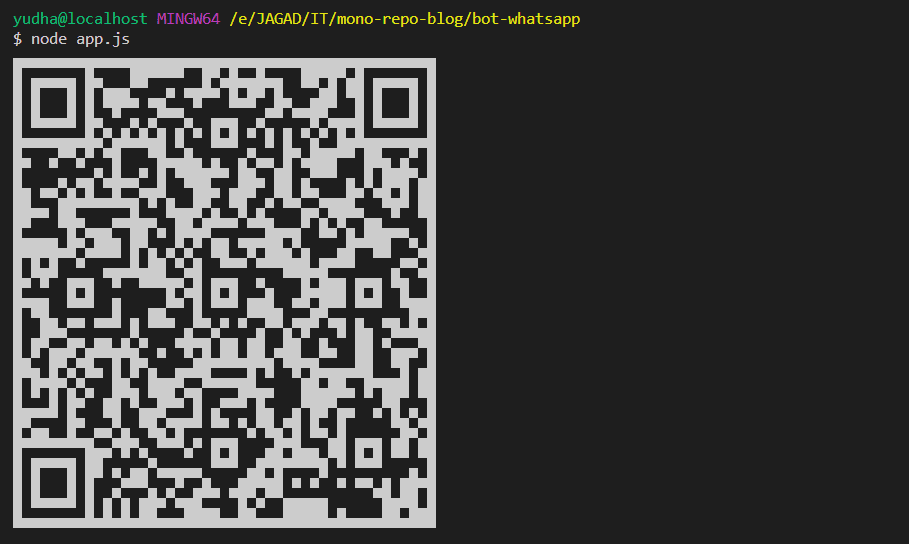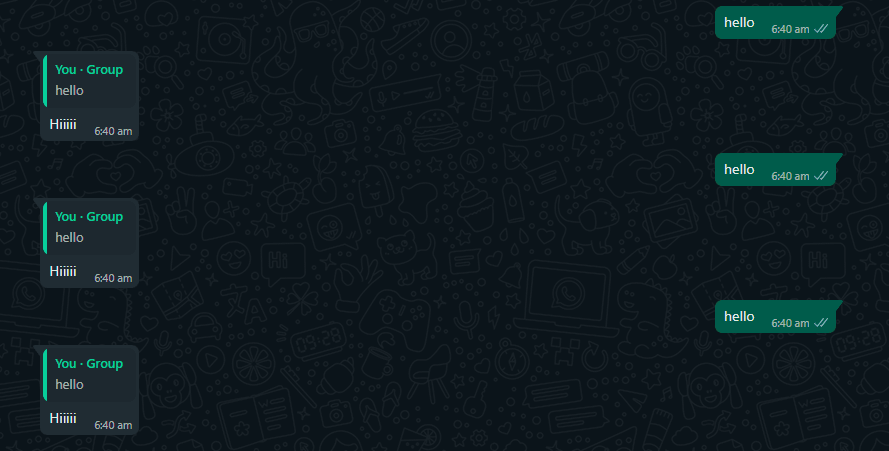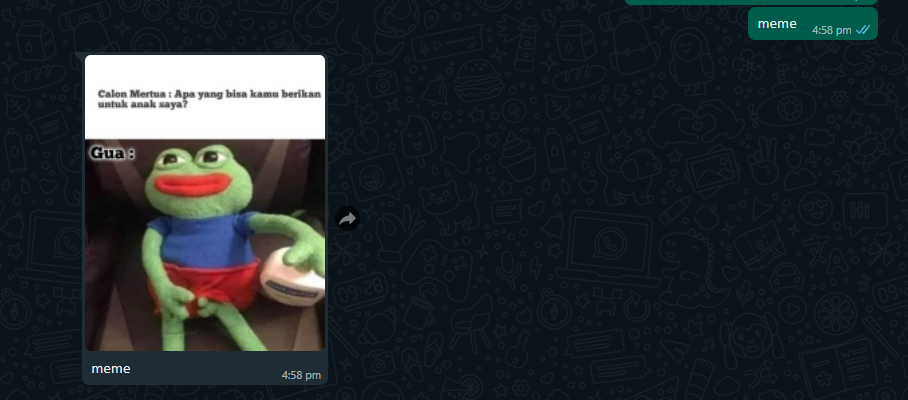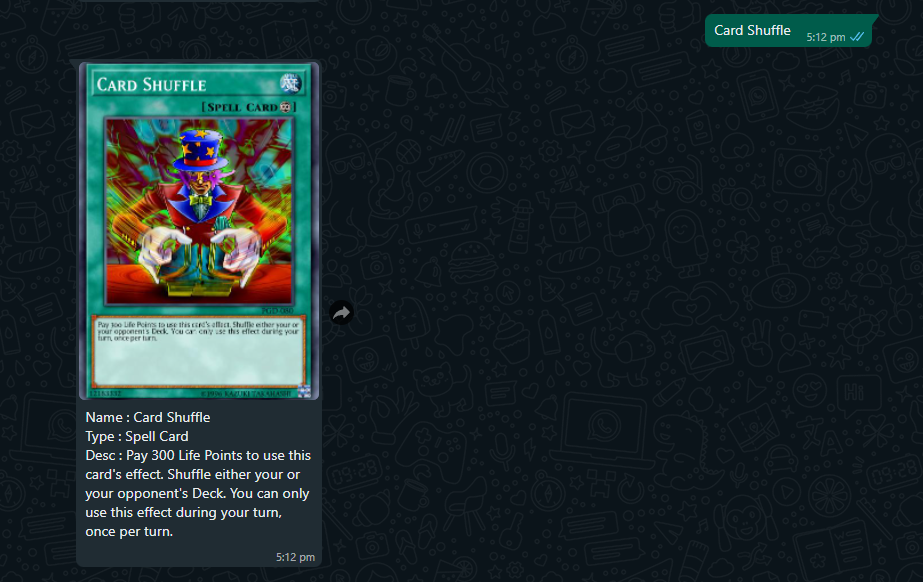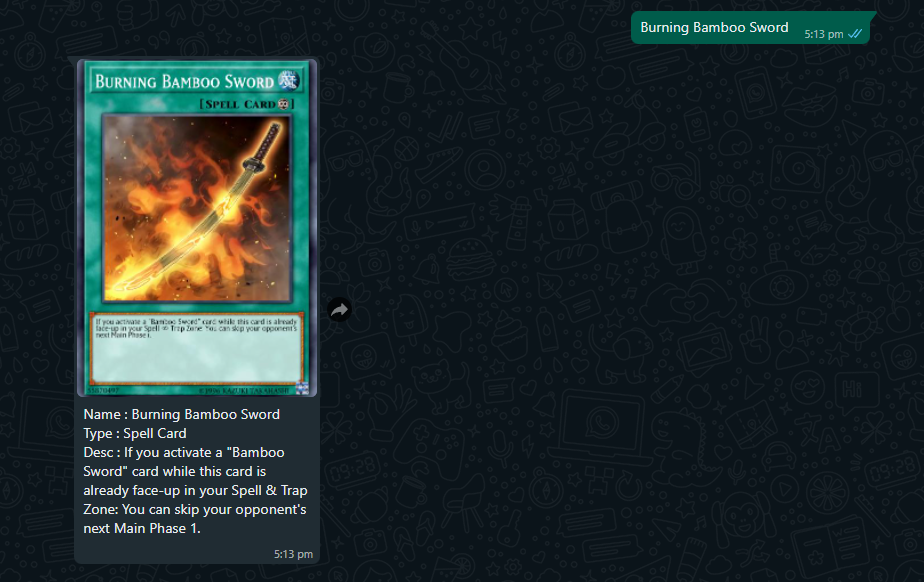| title | description | date | tags | ||
|---|---|---|---|---|---|
How to Create a Whatsapp Bot With Node.js |
Using a third-party library to make a WhatsApp bot for free and customable. |
2022-04-05 |
|
Table of Contents
- Introduction
- Required Libraries
- How to Run Program
- Replying Messages
- Create Authentication
- Replying Messages With Image
- Implementation with the Yu-Gi-oh API
- Conclusion
Introduction
WhatsApp Messenger is a cross-platform messaging app that lets us send and receive messages in real time. WhatsApp Messenger is used by almost everyone on the planet. Unfortunately, unlike Telegram, Whatsapp's API usage is still restricted.
In this post, I'll show you how to make a free Whatsapp bot with the help of a third-party library.
Required Libraries
Installing the library from npm requires first installing node.js 12 or higher, followed by installing library from the npm package.
Installing whatsapp-web.js:
$ npm install whatsapp-web.js
or
$ yarn add whatsapp-web.jsInstalling qr-code-terminal:
$ npm install qr-code-terminal
or
$ yarn add qr-code-terminalHow to Run Program
Create a file called app.js in the project and paste this code into it.
const qrcode = require("qrcode-terminal");
const { Client } = require("whatsapp-web.js");
const client = new Client();
client.initialize();
client.on("qr", (qr) => {
qrcode.generate(qr, { small: true });
});
client.on("ready", () => {
console.log("Client is ready!");
});Then, on the terminal or command prompt, type this command.
$ node app
or
$ node app.jsWhen the command is executed, a QR code appears, which we will scan with the Whatsapp account we used to create the bot.
Replying Messages
The goal of creating a bot is for it to be able to respond to messages. So, in the project that we created before, paste the following code.
//Replying Messages
client.on("message", (message) => {
if (message.body === "hello") {
message.reply("Hiiiii");
}
});When someone else types a hello message to bot, we'll make the bot reply to it.
Create Authentication
The function of creating authentication is that we don't have to login (scan QR code) every time we run an app.js.
Here is the code to create authentication :
const qrcode = require("qrcode-terminal");
const { Client, LocalAuth } = require("whatsapp-web.js");
//store authentication data to a file
const client = new Client({
authStrategy: new LocalAuth(),
});
client.initialize();
client.on("qr", (qr) => {
qrcode.generate(qr, { small: true });
});
client.on("authenticated", () => {
console.log("AUTHENTICATED");
});
client.on("ready", () => {
console.log("Client is ready!");
});
client.on("message", (message) => {
if (message.body === "hello") {
message.reply("Hiiiii");
}
});Replying Messages With Image From Url
On the other hand, bots are less interactive if they only reply with text messages, so we can reply to messages using media such as images.
Here is the code to make bot replying with media:
const qrcode = require("qrcode-terminal");
const { Client, LocalAuth, MessageMedia } = require("whatsapp-web.js");
const client = new Client({
authStrategy: new LocalAuth(),
});
client.initialize();
client.on("qr", (qr) => {
qrcode.generate(qr, { small: true });
});
client.on("authenticated", () => {
console.log("AUTHENTICATED");
});
client.on("ready", () => {
console.log("Client is ready!");
});
//Replying Messages with image from url
client.on("message", async (message) => {
if (message.body === "meme") {
//get media from url
const media = await MessageMedia.fromUrl(
"https://user-images.githubusercontent.com/41937681/162612030-11575069-33c2-4df2-ab1b-3fb3cb06f4cf.png"
);
//replying with media
client.sendMessage(message.from, media, {
caption: "meme",
});
}
});We'll make the bot respond with an image whenever someone else types a meme message.
Implementation with the Yu-Gi-oh API
to prove that the library can be adjusted to fit the needs of the case study. In this case, I'll use the YGOPRODeck Yu-Gi-Oh! API.
The following is how the Yu-Gi-Oh! bot that we will make works:
- Someone typed
Yugioh Card Namevia WhatsApp message. - The card's name will be checked against the database.
- If the Yugioh Card Name is found in the database, the bot will respond with the card's image.
An extra library called Axios is required for the WhatsApp bot to be able to send requests to the Yu-Gi-Oh! API:
$ npm install axios
or
$ yarn add axiosHere is the complete code of the Yu-Gi-Oh! bot:
const { Client, LocalAuth, MessageMedia } = require("whatsapp-web.js");
const axios = require("axios");
const client = new Client({
authStrategy: new LocalAuth(),
});
client.initialize();
client.on("qr", (qr) => {
console.log("QR RECEIVED", qr);
});
client.on("authenticated", () => {
console.log("AUTHENTICATED");
});
client.on("ready", () => {
console.log("Client is ready!");
});
client.on("message", async (msg) => {
if (msg.body) {
axios
.get(
`https://db.ygoprodeck.com/api/v7/cardinfo.php?name=${encodeURIComponent(
msg.body
)}`
)
.then(async (res) => {
if (res.data.error) {
msg.reply("No card matching your query was found in the database.");
} else {
const media = await MessageMedia.fromUrl(
res.data.data[0].card_images[0].image_url
);
client.sendMessage(msg.from, media, {
caption: `Name : ${res.data.data[0].name}\nType : ${res.data.data[0].type}\nDesc : ${res.data.data[0].desc}
`,
});
}
})
.catch((error) => {
console.error(error);
});
}
});I'm attempting to type a message using the text from the Yu-Gi-Oh! card Card Shuffle and then the bot responds with a photo and description of the card we sent before.
I was trying to type a message using another name for Yugioh's card, called Burning Bamboo Sword.
Conclusion
Because the WhatsApp API is still limited, third-party tools like whatsapp-web.js help a lot. However, since this library is not affiliated with WhatsApp, there are still many problems.


